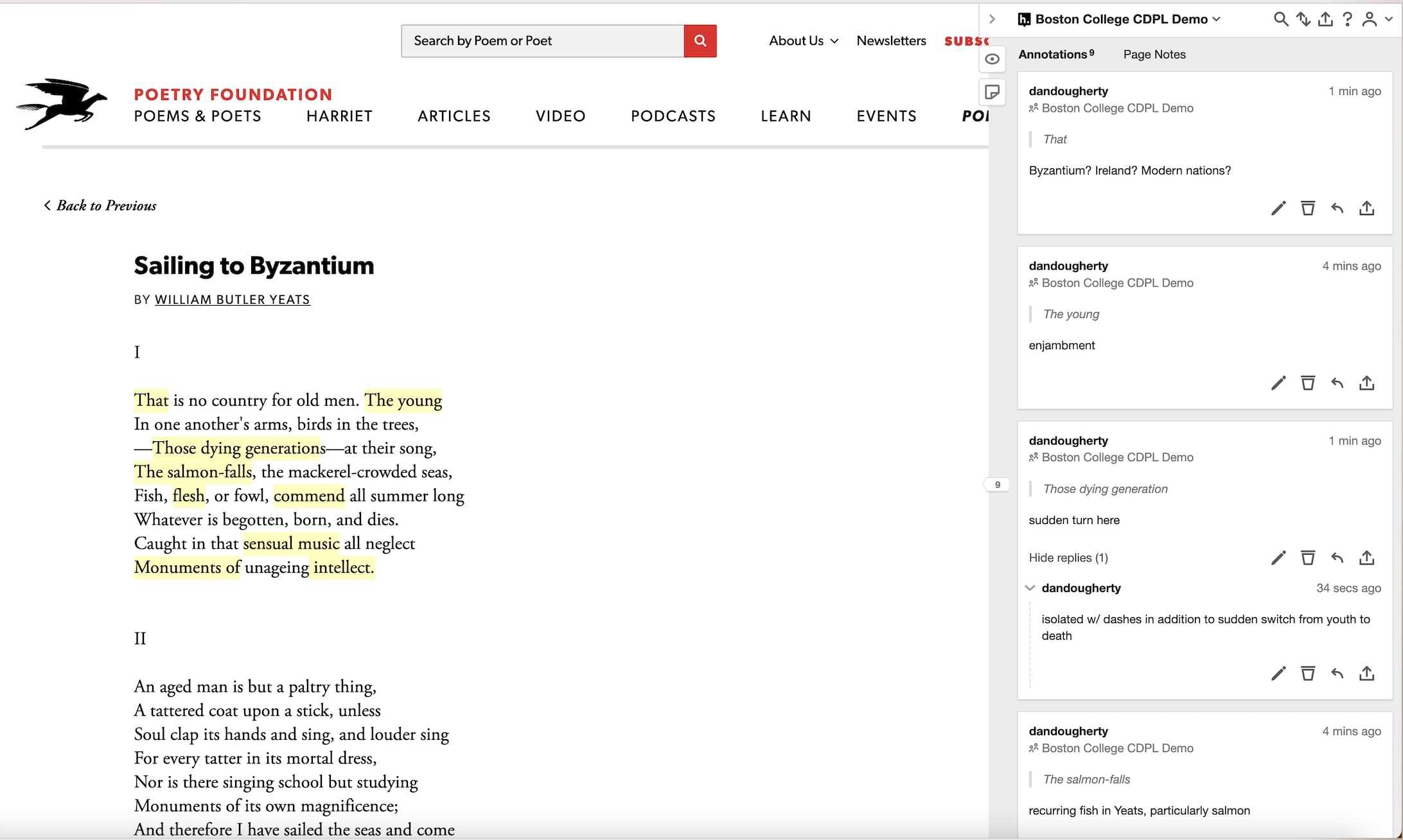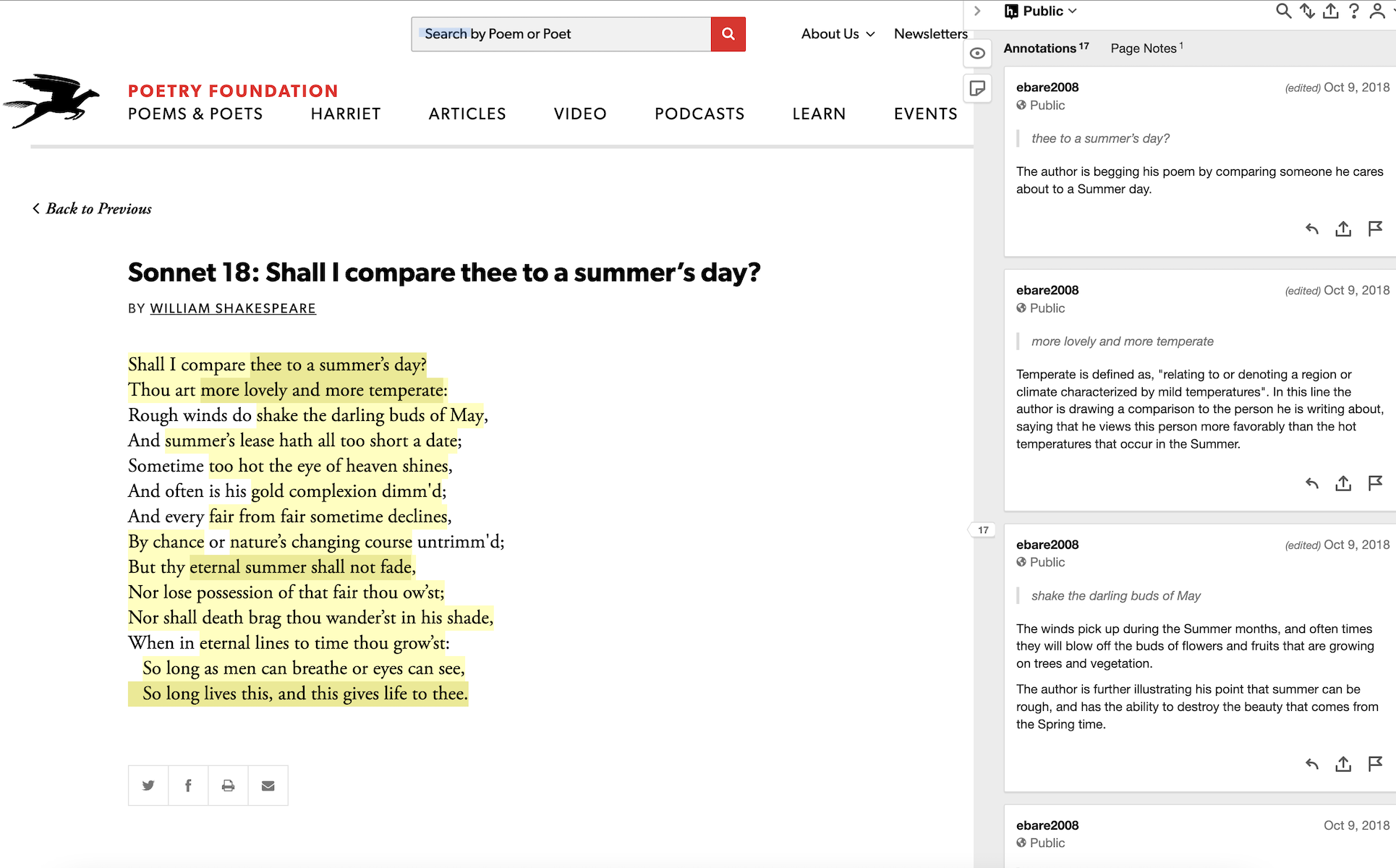
Poetry Research with Hypothes.is
Poetry offers many challenges for students, from parsing meaning to understanding structure and beyond. Over the course of a full semester, or perhaps a unit on poetry, this lesson plan teaches students to break poetry down into its components, guide their classmates through difficult poems, and move beyond the literal words on the page towards holistic meaning. This lesson plan is most suitable for a course which returns frequently to difficult and intriguing poems throughout the semester.
Genre of text: poetry
Course level: beginner to intermediate
Student difficulty: moderate
Teacher Preparation: moderate
Semester time: recurring assignment
Estimated time: at least thirty minutes prior to class, fifteen minutes or more in class
Learning Objectives:
- Students will become more familiar with poetry and poetic conventions
- Students will become comfortable leading and guiding class discussions
- Students will learn to write generative discussion questions
- Students will practice the basics of independent research
Exercise:
Break students into groups of three to four, and assign them one or more class sessions during the course of the semester when they will be asked to become experts in a given poem or small set of poems you indicate. In a unit on Shakespeare, for example, it would be most helpful to assign a particularly thorny sonnet that typifies Shakespeare’s authorial moves. In a considerably longer poem or narrative poem (Tintern Abbey, Don Juan, The Canterbury Tales), assigning the experts a selection of consecutive and indicative lines would be best.
Class Prep
Prior to class on the day they are assigned as experts, ask students to do all of the following:
- Create annotations which summarize each section of the poem. For certain poems this could be one annotation per stanza, and for others this may mean considerably more or less annotations.
- Create annotations marking several literary devices employed by the poet, providing definitions for their classmates and a basic explanation of the purpose of that device in the given poem.
- Create annotations providing historical context, biographical information as necessary, commentary on the structure of the poem, and difficult or unusual definitions.
- Provide links to artwork or online encyclopedia entries which pertain directly to the poem, its author, and its place in literary history.
- Create a note which asks approximately four open-ended questions informed by the independent work each group has done. These questions should move beyond summary or reading comprehension: remind your students that their work on the poem before class already helped their peers understand the basic mechanics of the poem!
- Circulate the link to their work and annotations the evening before class, so their peers can look through the annotations and come to class with better understanding of a difficult poem and some pre-prepared remarks based on the discussion questions.
During Class
At the beginning class time, the experts for the day should read their poem aloud, and talk through their findings as their peers look along on their laptops or phones. Encourage them to explain their process, why they annotated what they did, and any burgeoning methodology or further questions they’ve uncovered. You should feel free to step in and guide class discussion if it tapers, but encourage your students to work through the questions asked by their peers and ask questions of the experts: over the course of the semester, they’ll be asked to fill the same role.
As always, discussion might flow very easily or grind to a half prematurely. In both cases, for the remainder of class, return to themes and ideas the experts pulled from their given poem as they emerge in other assigned poetry, either from that day’s reading or prior assignments. Students may misread lines or sections of poetry, but it is paramount to encourage them to continue beyond their comfort zones in their annotation over the semester: the most interesting annotations and questions will likely come from a place of uncertainty, and students will be hesitant to formalize their uncertainty in a written annotation their peers have access to if they are uneasy with how their comment will be treated in class.
It may be useful for instructors to model this assignment during the first week of coursework, providing students with a clear example of your expectations before giving them this assignment. Instructors can accomplish this either by pre-preparing an example, or by collaboratively working through a poem during class time, depending on scheduling constraints.
Example:

